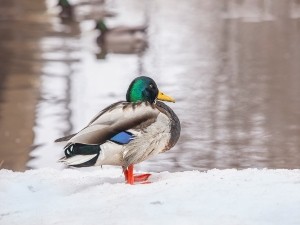
Ducks aren’t exactly the quietest of animals, these birds can usually be heard making loud quackling noises, but you shouldn’t be able to hear these birds breathing
If you can hear your duck breathing you’d be right to be worried, this article explores why this happens
Table of Contents
I can hear my duck breathing:
A change in your duck’s breathing is something to definitely look into, there are a couple of reasons for this including:
Blocked nostril:
The simplest and most benign reason for a duck starting to breathe so hard that you can hear its breathing is that the bird has something stuck in its nostril (its nare)
Ducks can’t use their fingers to get things out of their nares, but these birds do need to clean out their nares, the birds do this by dunking their heads underwater and blowing air out
Doing this gets rid of any blockages in the bird’s nose. If the bird doesn’t have access to a clean pool of water that the bird can do this in then the bird can develop blockages in their noses.
What to do:
Have a look inside of the bird’s nose to see if anything is blocking the bird’s nose, if there is then make sure that the birds have access to clean water that they can dunk their heads in.
You can leave treats at the bottom of the water to incentivize the bird to dunk its head if needed.
Egg yolk perttonitis:
Another reason why your duck may be breathing heavily may be because the bird has egg yolk peritonitis, this ailment affects laying birds
Eggs in the bird’s body start to develop when the egg yolk is released by the bird’s ovary into a tube in the bird’s body called the oviduct.
If there is a mishap, and the yolk enters the bird’s abdominal cavity, and not the oviduct, then the abdominal cavity membrane lining will become inflamed, this condition is called egg yolk peritonitis.
Other signs of this ailment, including heavy breathing, include depression, a wide-based stance, weakness, anorexia, pain, a lack of vocalization, and an overall change in the bird’s regular behavior.
What to do:
Treatment of this ailment involves removing the egg yolk from the bird’s abdomen. It is recommended that you get a vet to do this.
However, even if you do manage to treat the bird this can happen again in your bird.
Aspergillosis:
If you’re raising a young duck, or are raising a duck with a compromised immune system, and you start hearing your bird breathe heavily then the bird may have aspergillosis.
Aspergillosis is a respiratory disease also known as brooder pneumonia. This ailment not only affects ducks but also turkeys chickens, wild birds, and other waterfowl.
If there is mold in your bird’s environment the mold will release spores that the bird may have inhaled. The mold will invade the bird’s trachea, air sacs, and lungs causing breathing difficulties
Other signs of this ailment in your bird include increased thirst, gasping, emaciation, and eye swelling
What to do:
This ailment is usually treated with long term antifungal therapy. The therapy that can be given to these birds is an 8-week treatment
If you enjoyed this article then you may also be interested in other duck related articles. Here are some articles that you may be interested in: How To Get A Duck To Trust You, Why Would A Duck Be Alone?

